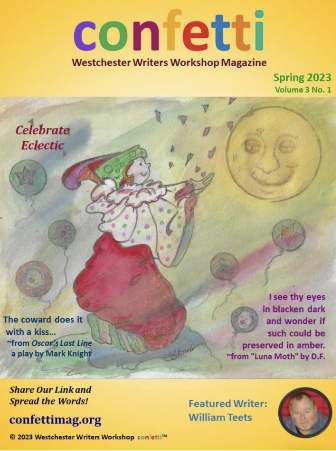Howard Morton loved greeting the dawn.
A wiry widower in better shape than most octogenarians at The Acres, he sported – and proudly never covered – a corona of white hair that Albert Einstein would have admired. Wakened by his smartphone at the faintest first light, he put on drab gray sweatpants, an equally colorless zippered sweatshirt, and vivid electric-blue Nike running shoes, then set out on a brisk walk twice around the complex.
that Albert Einstein would have admired. Wakened by his smartphone at the faintest first light, he put on drab gray sweatpants, an equally colorless zippered sweatshirt, and vivid electric-blue Nike running shoes, then set out on a brisk walk twice around the complex.
Save in inclement weather, he gave a toothy good-morning grin and wave to a pretty young woman who was busy delivering newspapers to his neighbors. Their silent communion was always at a different point on his matutinal route – whereby hangs a tale.
***
The Acres was a sprawling condominium of almost 300 apartments on a rolling hillside that had once been dairy pasture. It was girdled by a perimeter walkway whose uphill-downhill course assured the kind of aerobic exercise that doctors advise.
The essence of these peregrinations was making much of little, he told anyone who asked. For one thing, the nocturnal animals were not yet abed. There were almost always rabbits in the gardens, munching the buds of flowers that frustrated neighbors planted and re-planted.
There were often deer in the meadow; he tracked the growth of fawns that first appeared with timid, faltering steps in late spring. He occasionally glimpsed red-tailed hawks and sometimes an eagle aloft, as well as predators in the forest copse, coyotes and bobcats.
He tried binoculars, but gave them up when it became clear that age had robbed his arms of sinew and muscle. Better a distant but steady view of wildlife than bringing an animal closer in a view that wobbled enough to be slightly nauseating.
His hearing was still good, though, and the air was full of birdsong. His kids, who’d given him the smartphone and its dawn-detection app, also found him an app that catalogued and played back those calls. He spent days learning to use it, hoping to enjoy digital colloquies with robins and song sparrows.
Dear Mabel, who loved opera until the very end, had told him he was tone-deaf. Indeed, his ear turned out to be so insensitive that the only avian greeting he could recognize with certainty was the cardinal’s. He sometimes thought he’d heard a robin, but never managed to find and play it back; and he couldn’t begin to tell a warbler from a wren.
Never mind; there were always birds at neighbor’s feeders that he knew even in the crepuscular half-light: red cardinals, bright goldfinches, crimson-crested woodpeckers. And at times he simply paused to absorb the enlarging day, waiting for clouds to be painted by the sun.
And in some seasons, he left the sidewalk to get an early start on breakfast: He learned where to find strawberries, blackberries, red currants and blueberries, even hawthorn berries and tiny, tart crabapples in the fall. Foraging made him feel less frail, more manly.
The silent salutation with the newspaper lady was frosting on the cake – and happily, a cerebral prompt: He could calculate the time of year by where their paths crossed.
***
That was so because, year-round, she punctually arrived at The Acres within a minute or two of 6:00, to drop newspapers on the doorsteps of a hundred or so residents, almost unfailingly delivering the correct paper – the local, the New York Times or the Wall Street Journal – to the right thresholds.
In good weather, when she could save time by stepping outside to go from one level or one wing to another, the route took her an hour. If it was snowing or raining, she had to double back through long corridors and wait for slow elevators and it took an extra fifteen minutes.
Most of the year, she encountered Howard Morton somewhere along the way, returning his smile and wave. She too soon realized that even without a calendar or weather report, she could tell the season by where they reconnoitered. At the summer solstice in June he was close to finishing his walk when she arrived. At the spring and fall equinoxes in March and September, he was just setting out, and they crossed paths at predictable points midway.
At winter’s peak she never saw him at all, and missed him. She assumed she had finished her rounds before he started out.
***
She had that wrong. In the dead of winter, he didn’t walk at all. By the first of December, the sun didn’t rise until almost 7:00; by the winter solstice it rose at 7:15, and – even counting the feeblest daylight – the day was only nine hours long.
No sensible man, Howard thought, would go out into a cold, dark vacuum with almost no birdsong but the cooing of the damned pigeons, almost no avians but woodpeckers at feeders, not even leaves on most trees and bushes, and dangerously invisible ice patches likely to form here and there on sidewalks.
Bears, everyone knew, hibernate in winter. Other animals come close to that: Raccoons too – he looked it up – store up body fat in summer so they can spend most of the winter dozing in their dens, even if not in unbroken ursine sleep.
In the gloom of December and January, Howard did not get up at first light; if he woke, he rolled over and went back to sleep for another half-hour. Or hour. Or two. Sometimes he lulled himself back to sleep by leafing through the thesaurus of his mind: It wasn’t hibernation, quite; call it dormancy? inertia? indolence? torpor?
Torpor! That would do! In the dark of winter, let the newspaper lady make her rounds alone. Howard Morton enjoyed his torpor.
-End-
Published in the Spring 2023 issue of Confetti,
the magazine of the Westchester (NY) Writers Workshop






Yet another fun publication, Don. Your vocabulary always delights me. This particular story has vivid descriptions for the hearing as well as the seeing and feeling. And the pacing was just like Howard’s brisk morning constitution!
Glad to have read it and think you have a niche in portraying the life in a ‘retirement community” with some nuance that isn’t normally seen.